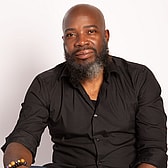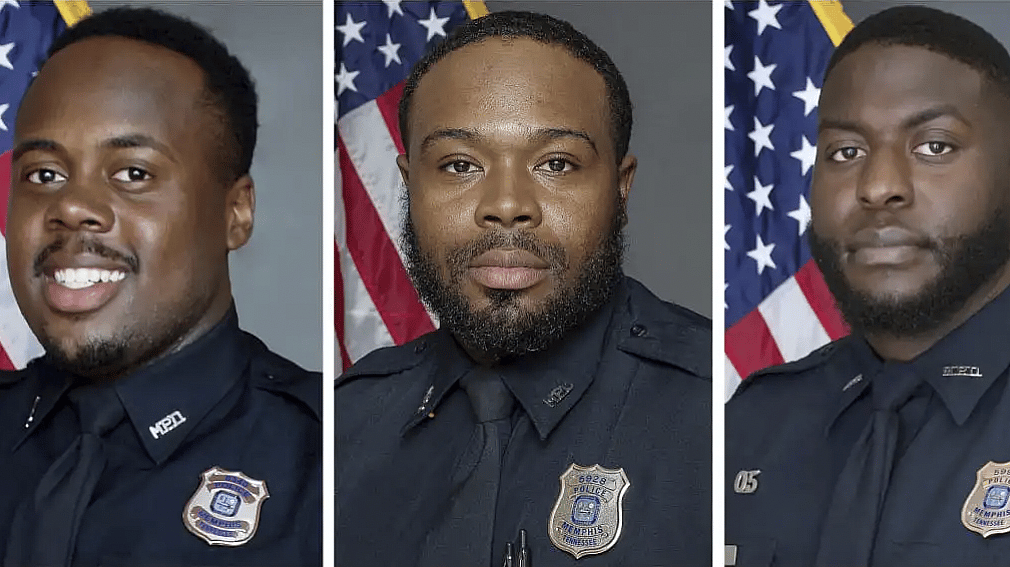Editor’s note: The following article is an op-ed, and the views expressed are the author’s own. Read more opinions on theGrio.
UPDATE: Sept. 13, 2023, 10:26 a.m.: On Tuesday, five former Memphis police officers involved in the beating death of Tyre Nichols were charged with federal civil rights violations. Read the news story here.
This week, those people perpetually blinded by the rockets’ red glare and bombs bursting in air watched the debut of another American horror story, featuring a familiar villain in the starring role.
On Friday, the city of Memphis released footage of the three-minute beating of 29-year-old Tyre Nichols by five Memphis, Tenn. police officers, all of whom are Black. According to the Associated Press, the officers have been charged with “second-degree murder, aggravated assault, aggravated kidnapping, official misconduct and official oppression.” Perhaps the only novel part of this hackneyed premise is the plot twist white people have already raised:
How can a Black person be racist against a Black person?
Spoiler alert: Black cops can be racist because they are Black cops.
To be fair, I understand the confusion. Many white people have bought into a manufactured definition of racism that includes intent, hatred and Jesus knowing “what’s in their heart.” While I have never subscribed to the theory that Black people can’t be racist, I understand why Black people believe power is a necessary component of racism. Still, when defining words, I tend to cite a little-known book called a dictionary. One of these books, published by an obscure publishing company called Merriam-Webster, defines racism as “the systemic oppression of a racial group to the social, economic, and political advantage of another” or a “political or social system founded on racism and designed to execute its principles.”
Let there be no doubt; slavery is racist. The constitutionally-protected, race-based system of human ownership euphemized as “slavery” was a system designed to oppress a specific racial group to the social, economic and political advantage of another. Criminologist Victor Kappella dates the origin of American policing to 1704, when the Carolina Colony developed slave patrols to “maintain the economic order and to assist the wealthy landowners in recovering and punishing slaves who essentially were considered property.”
Other historians cite the 1838 creation of the Boston Police Department as the “first modern American police force.” But, three years earlier, after Black abolitionist David Walker published his Appeal to the Colored Citizens of the World, North Carolina Gov. John Owen sent a letter to “the police of the principal towns in the state and the Senators in thirty-two eastern counties,” writing:
“I beg you will lay this matter before the police of your town and invite their prompt attention to the necessity of arresting the circulation of the book… I would suggest the necessity of the most vigilant execution of your police laws and the laws of the State.”
If the police had not yet been created, who was he talking about?
He was talking about the slave catchers. He was telling them to stop Black people from contemplating freedom. He was referring to a “political system founded on racism and designed to execute its principles.” There is no need to extrapolate an opinion because he literally said it.
He was talking about the police.
So when demonstrators, activists and regular Black people refer to the police as racist, they are not complaining about the content held within the individual hearts of cops. They are not protesting the intent of each individual law enforcement agent or their feelings for Black people. They are talking about the system of policing, which, according to that little reference book, fits the exact definition of racism. The meaning, history or purpose does not change because the person performing the job has a different skin color. If Beyoncé wore whiteface, she wouldn’t automatically gain the ability to play the banjo and become Taylor Swift. A man who plants and harvests seeds is a farmer, even if he is wearing a tuxedo.
Farmers farm.
Singers sing.
Police perform racism.
Along with Tyre Nichols, whose videotaped assault was released on World Holocaust Remembrance Day, we should remember the examples of Emil Maurice and Erhard Milch, two men of Jewish descent who managed to survive their government’s race-based terror campaign.
According to his biography, Maurice was a watchmaker from Germany who was an activist and a great fighter. He was the founder of a militia group and served as a driver for his best friend. A Schutzstaffel stormtrooper (SS) leader ranked as high as #168 eventually discovered Maurice’s Jewish heritage and told Maurice’s boss. Fortunately, Maurice was so beloved that his boss declared Maurice an “honorary Aryan.”
It probably helped that Emil was the man who founded the group called the SS. It likely helped even more that the best friend of Emil Maurice, who was SS #2, was ranked SS #1. Even if you don’t know a lot about Nazis, you may have even heard of Emil’s friend:
Some guy named Adolph Hitler.
And that brings us to Erhard Milch.
When accusations of Milch’s Jewish heritage surfaced, Hermann Göring — the chief of the Gestapo secret police force — famously declared: “I decide who is a Jew.” Milch oversaw the production and supply for the Luftwaffe, the German air force. To build the German air fleet, Milch personally imported slave laborers from the concentration camps. During a mutiny at one of the factories, Milch suggested that guards shoot every tenth protester. That way, they could maintain order while not depleting their workforce.
When Milch surrendered in a restaurant to British Brigadier General Derek Mills-Roberts (No, Derek is not Black. There used to be a lot of white Dereks) he justified his reason for enforcing a system based on racism. According to “Endgame, 1945: The Missing Final Chapter of World War II” by David A.T. Stafford, when Mills-Roberts asked Milch about the atrocities committed in his name, the Jewish, yet antisemitic and Nazi slave supervisor’s response perfectly encapsulates how a Black police officer can be racist against Black people:
“These people are not the as you and me….”
That’s how white supremacy works. It has no logic, principles or values. It does not adhere to rules and does whatever it wants. Its only precedent is the well-worn plot that has become as commonplace as the savagery it depicts.
This is also how policing works.
It has no values, principles or laws to enforce. It murders the people it promises to protect and steals the lives of those it supposedly serves. Whether you are in a forced labor camp, a protestor or a Black person in America, the identity of the person wearing the uniform does not matter. All their badges are swastikas. We are all their human chattel.
And, of course, there are some good cops. I cannot confirm this as a fact, but I have heard people speak of their existence. Then again, if you told me that Nazis of Jewish descent engineered some of the best airplanes and most reliable watches, I might believe you. However, I still wouldn’t call them “good Nazis.” In fact, I don’t get to decide who’s good, who’s bad, who’s guilty of murder, or who should be deemed a “racist.”
Someone already created a system for that.
Whether one places the blame upon all police, racist police, or the specific men who robbed Tyre Nichols of his life, liberty and the pursuit of happiness, I’m sure we can agree on one thing:
These people are not human beings in the same way as you and me.
Editor’s note: This story has been updated to reflect the circumstances and content of Erhard Milch’s encounter with British Brigadier General Derek Mills-Roberts.

Michael Harriot is a writer, cultural critic and championship-level Spades player. His book, Black AF History: The Unwhitewashed Story of America, will be released in 2023.
TheGrio is FREE on your TV via Apple TV, Amazon Fire, Roku, and Android TV. Please download theGrio mobile apps today!


